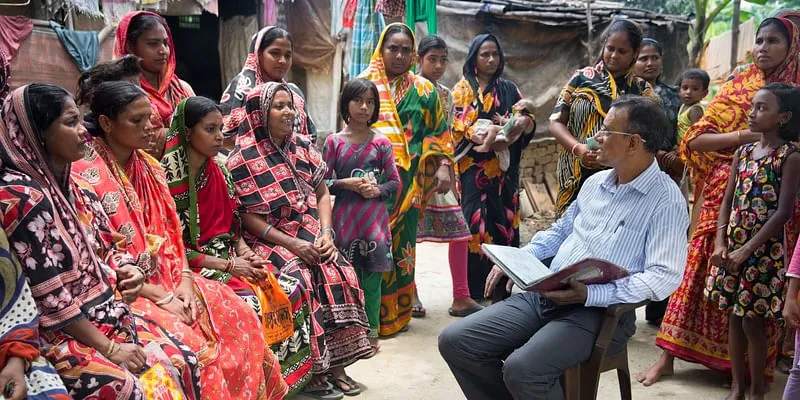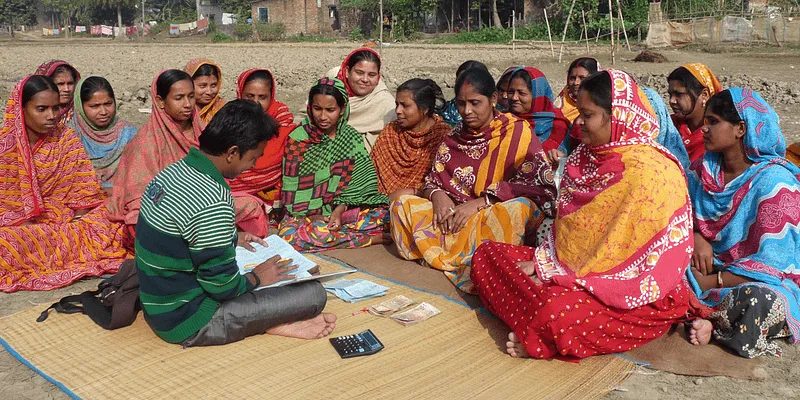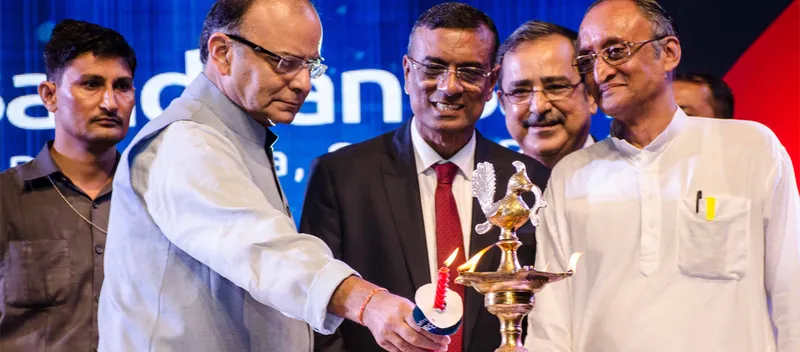
By Tenzin Pema
“Whoever controls the finances, controls the family, the society, and even the country.” With this realisation, gender equity champion and Bandhan Bank Founder Chandra Shekhar Ghosh set out on a lifelong mission to transfer power into the hands of women and build a financially inclusive India.
A mission that began more than 20 years ago and officially took shape in 2001 when he first started microfinance operations for women in rural West Bengal through a not-for-profit enterprise that later became Bandhan Bank. Now two decades later, Bandhan Bank has more than 15 million women customers who make up two-thirds of the bank’s total customer base of 22 million.
And yet, Bandhan Bank MD and CEO Chandra Shekhar Ghosh emphasises “this is not the end” in the bank’s aim to reach women in the most underbanked and under-served communities across India. He tells YourStory Founder and CEO Shradha Sharma in a recent interview,
“Now 1 crore 50 lakh women are my customers. I’ve been increasing this on a day-to-day, month-on-month basis. But this is not the end. There are many more customers I can reach. Every time new customers are coming (to us). New mothers are coming (to us). They tell us about their very bad experiences with their families, but they’re now able to start a new business or re-start an existing one or jointly work for their husband’s business. So that is a change I have seen.”
And yet, this change did not come about overnight. It took years of relentless work in building trust among the women and their families in these rural areas, understanding their challenges, and learning about their circumstances first-hand.
Enabling women empowerment and female entrepreneurship
Indeed, Bandhan Bank — which became the first microfinance institution in India to get a universal bank license and operate as one in 2015 — has gone from just 2,523 banking outlets when it launched five years ago to over 5,300+ such outlets and 1,000 bank branches across 34 states and union territories out of the total 36 by 2020.
With the bank’s wide reach and Chandra Shekhar’s innate understanding of the challenges facing the most underbanked sections of the country, Bandhan Bank is today widely recognised for its role in serving all socio-economic sections, with a particular focus on its accomplishments in enabling women empowerment, promoting female entrepreneurship, and eradicating poverty in some of the most remote, rural areas of India.
Today, if women in rural India need money to start a business or properly run or expand an existing one, they know where to go to get that money, says Chandra Shekhar. “That is the confidence that has come to them,” he adds.
Along with this confidence, has come financial independence and power. With the money loaned to them by Bandhan Bank, many women have turned entrepreneurs and have been able to support their families and their children’s education.

Bandhan Bank CEO & MD Chandra Shekhar Ghosh interacts with the bank’s women customers, many of whom have turned entrepreneurs
Take the example of Renuwara Bibi from Pakur town in Jharkhand. With a Rs. 7,000 loan from Bandhan Bank in 2008, Renuwara started her own grocery store to support her family of four who were unable to make ends meet with just her husband’s teaching income. With subsequent Bandhan loans, Renuwar started her own entrepreneurial venture manufacturing disposable paper utensils and now runs a flourishing business that employs several people.
Nilam Devi from Begusarai in Bihar is another successful Bandhan Bank-enabled entrepreneur. Thanks to the simple loan application process at Bandhan Bank, Nilam was able to secure her first loan of Rs. 10,000 with which she started her own costume jewellery business. With the financial stability that her venture has provided her, Nilam has been able to champion her children’s education and provide jobs to others in the community.
Indeed, there are countless such stories of women empowerment in all corners of the country. Chandra Shekhar credits this success to the commitment of the women to their work and their drive to improve their circumstances.
He admits these successes are a matter of pride for him. Especially given the slew of challenges he faced early on in his efforts to empower the women of a community.
“A very big challenge has been to transfer power from men to women. This is very tough in our country. Even though women have the income, it is not very easy to transfer the power. Because ours is a predominantly patriarchal society,” he tells YourStory.
Initially, the men found it difficult to accept that the women were being given the money. Because of this, Chandra Shekhar observed that the beatings and the violence increased in these homes. But slowly, he also saw that the men began to realise that the women were the source of the money since only the women could avail of these loans.
With this realisation came the fear that their wives may return to their father’s house, which meant that they would lose the source of their money. And so, the men gradually began to realise they have to work jointly with their wife and treat her with respect.
In this manner, the wins have kept coming over the years — in different ways, in different sizes. Some were small wins. Some big. But they were all alike in that they signalled the slow and steady transfer of power into the hands of these women.
Like when Chandra Shekhar would visit a bank branch. He saw how all the mothers would be seated inside in the branch while their husbands stood outside waiting for them. “This is power. This is the only office where husbands do not have the power, but where the women do,” Chandra Shekhar says triumphantly.
Many times, Chandra Shekhar would quietly observe such goings-on in the bank branches. Witnessing this ‘change’ taking place. This transfer of power. This change in stature for the women. He elaborates,
“Many times I observe how the men stand outside the bank branch talking amongst themselves. And later when the wife comes, they take her home on the backseat of the bicycle, all the while talking very patiently and respectfully with her. So things have been changing.”

Bandhan Bank: the genesis and impact
Indeed, these are welcome changes for Chandra Shekhar, whose early observations in the 1990’s about the status of women in the family shaped his drive to enable women empowerment while his observations about the plight of small-time traders fueled his desire to help them and work towards a more financially inclusive India.
As a young NGO worker at the time, Chandrasekhar saw up close the life of the women in the family. He observed the amount of responsibilities they shouldered through the day, the long unforgiving hours they worked without any display of complaint, the violence and disrespect they were subjected to, and their lack of status in their family and society despite their many contributions.
Simultaneously, he observed how these less privileged families had to go to the money-lenders and take high-interest loans to meet their daily needs because the banks would not lend to them.
Driven by a deep desire to help these people by doubling the family income and empowering the women, Chandra Shekhar started a not-for-profit society in 2001 to provide microloans to women.
“So that’s when I decided to start this NGO where we can empower the women to earn money on their own and that can add to the family income while also reducing the fighting between the husband and wife and improving the life and educational scope for their children,” Chandra Shekhar recalls.
Today, more than two decades later, Chandra Shekhar has been able to accomplish all he set out to do and at a greater scale. On his field visits, people tell him, “Sir, whatever you see with your eyes, all of it has been developed by you.” When he sees this, he feels a sense of pride at the level of impact he has been able to create with his efforts so far.
On another field visit, he saw a person sleeping in the house of a women customer. He asked the lady if the person was her relative and she responded, “Sir, now because I have an income, my relatives have also started coming. Earlier nobody gave me a chance.”
“This is power,” Chandra Shekhar says. “When you talk to these people and ask them about the beginning of their life, they cry. They say, where we were and where we have come. So, this is where I feel humbled and happy that God has given me the opportunity to do something for these people.”

But there’s more to be done to empower women and build a financially inclusive India, he adds.
For one, the husband’s participation in shouldering the responsibilities within the house have to increase, as women still end up doing all the housework in addition to running businesses, Chandra Shekhar says. Second, there’s still a large number of women who don’t have any access to credit. The reasons for this could be either societal or political. They should also get access to credit, he adds.
Because as Chandra Shekhar emphasises, in the pursuit of women empowerment, their financial freedom is key.
“Till now, we’re trying to empower women. But you see, finance is a power – whoever has the control of the finances, controls the family, the society, and even in the country,” he signs off.






